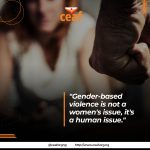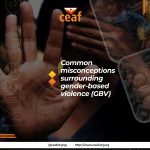Gender-Based Violence (GBV) is a deeply painful reality that can touch anyone’s life, regardless of their gender, age, background, or social status. It’s not confined to certain groups or places; GBV can happen anywhere, to anyone. It’s important to understand that GBV is not just a statistic or a news headline—it’s a lived experience that leaves lasting scars, both visible and hidden.
Imagine a world where your daily safety and dignity are constantly threatened, simply because of your gender. For many, this is not just a fear but a reality. GBV can take many forms—physical, emotional, sexual, or psychological abuse—and it’s often perpetrated by someone the victim knows, trusts, or even loves. This betrayal makes the pain even deeper, as it not only harms the body but also breaks the spirit.
The effects of GBV ripple through communities, affecting families, friends, and future generations. Survivors of GBV often carry the burden of their trauma in silence, fearing judgment or disbelief. The emotional toll can be devastating, leading to feelings of isolation, depression, and anxiety. The physical consequences can be severe, sometimes even fatal.
But GBV doesn’t just impact the individuals directly involved. It can also tear apart the fabric of communities, spreading fear and distrust. When one person suffers, we all suffer. It’s a collective wound that requires collective healing.
Addressing GBV requires courage, empathy, and action. We must listen to survivors, believe their stories, and support them in their healing journeys. We must educate ourselves and others about the root causes of GBV, challenging harmful stereotypes and behaviors that perpetuate violence. And most importantly, we must stand together, united in our commitment to create a world where everyone can live free from fear and harm.
No one should have to live in fear of violence because of who they are. By raising our voices and taking action, we can help break the cycle of GBV and create a safer, more just world for everyone.



0 Comments